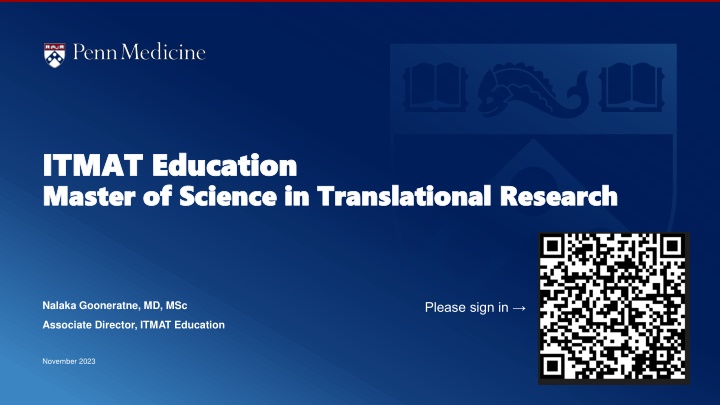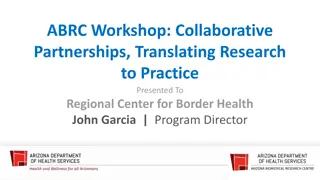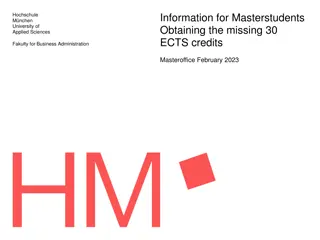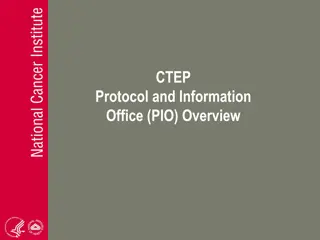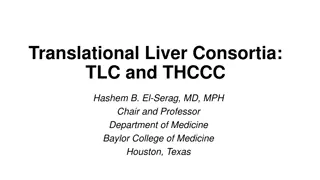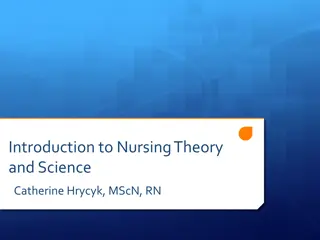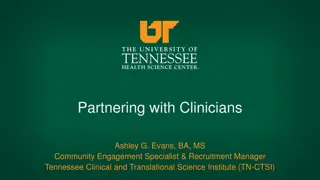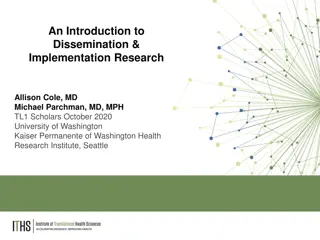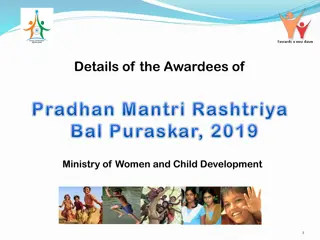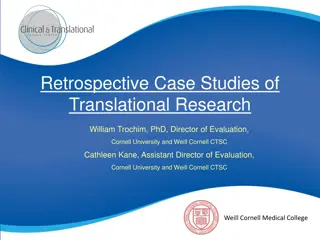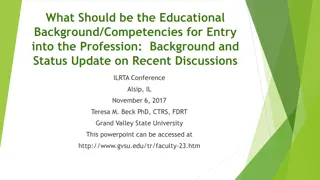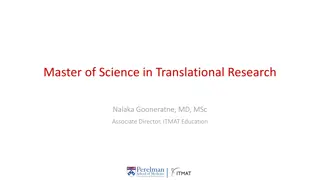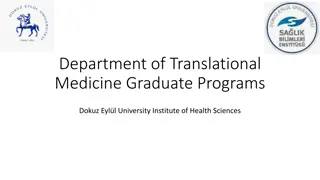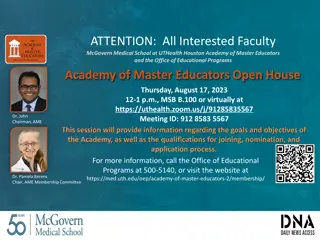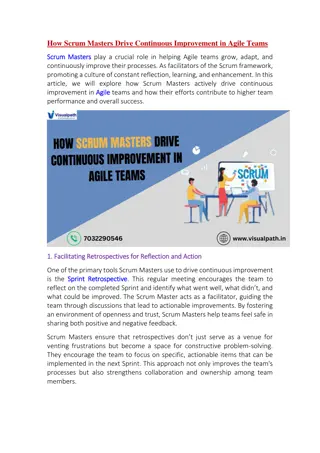Master of Science in Translational Research Overview
The MSTR program focusing on clinical research, translational therapeutics, and research methodologies. Learn about concentrations, curriculum, application process, and overall program goals to develop critical thinking skills in the field. Discover opportunities for hands-on experience and professional development in a supportive environment
Download Presentation

Please find below an Image/Link to download the presentation.
The content on the website is provided AS IS for your information and personal use only. It may not be sold, licensed, or shared on other websites without obtaining consent from the author.If you encounter any issues during the download, it is possible that the publisher has removed the file from their server.
You are allowed to download the files provided on this website for personal or commercial use, subject to the condition that they are used lawfully. All files are the property of their respective owners.
The content on the website is provided AS IS for your information and personal use only. It may not be sold, licensed, or shared on other websites without obtaining consent from the author.
E N D
Presentation Transcript
ITMAT Education ITMAT Education Master of Science in Translational Research Master of Science in Translational Research Nalaka Gooneratne, MD, MSc Please sign in Associate Director, ITMAT Education November 2023
The Research Landscape Definition of Clinical Research Clinical Research Clinical Trials Observational Studies Pragmatic trials Proof of Concept Animals Proof of Concept Humans Basic Research + Translational Research Innovation + Health Sciences Policy + Health Systems Research
Overall Goals of MSTR Program TEAM MENTORING Prepare trainees to think critically to pose and answer research questions Experiential Laboratory Rotation, Externship Didactic Courses Provide a mentored training experience in translational research via a structured curriculum to support project execution and professional development Degree Components Professional Development Research Project 3 March 2, 2025
MSTR Concentrations Connecting the basic science of disease with human medicine Adopting informatics methodologies to develop and test hypotheses Discovery Translational Therapeutics and Regulatory Science Core Courses Bioinformatics/ Biomedical Informatics Navigating both business and academic environments during research conduct and evaluate commercialization opportunities Entrepreneurial Science Testing discoveries for clinical effect
General Information The program enrolls ~15 students per year Funded (NIH CTSA TL1) trainee slots for predoc students are available Students apply 3rd year of Med School (December 1 Deadline) Interviews are in January; Selection occurs in January/February Students start program at the end of 3rd year (July) 5 March 2, 2025
MSTR Curriculum Four Pillar Areas 12 cu Professional Skills Development Program RESEARCH METHODS & IMPLEMENTATION MIN OF 3 CU ANALYTICAL SKILLS RESPONSIBLE CONDUCT OF RESEARCH SCIENTIFIC WRITING MIN OF 1 CU MIN OF 1 CU MIN OF 1 CU MTR 6020 REQUIRED MTR 6040 REQUIRED MTR 9999 LAB (2 CU REQUIRED) SELECT 4 CUs GUIDED BY MSTR CONCENTRATION AND/OR RESEARCH INTERESTS SUCCESSFUL MSTR THESIS (MTR 6070, MTR 6080)
Integration of Curricula YEAR FALL SPRING SUMMER Module 1 Module 2 1 Module 2 Module 4 Module 4 2 Module 4 Module 5 Step 1 USMLE Matriculate into MSTR July (during Summer Session II semester) Apply to program 3 Research & course work MSTR Research & course work MSTR Research & course work MSTR Research & course work 4 MSTR Research & course work Module 5 Complete research 5
MSTR Sample Plan of Study Each student is guided by a mentoring team to develop a plan of study tailored to research and career interests. MSTR First Year Summer II Fall Spring Summer MTR 6010 Review Writing MTR 6040 MTR 6000 Biostats Scientific & Ethical Conduct MTR 6050 *full summer course* Data Manuscript Writing MTR 6020 Proposal Development IRB Membership begins (6 months) MTR 9999Lab 1 MTR 6030 Professional Skills Development Program (Years 1 & 2) Disease Measurement MTR Elective 1 MSTR Second Year Fall Spring Summer Summer II MTR 6070 Thesis MTR 6080 Thesis Thesis Defense Graduation MTR Elective 2 MTR 9999 Lab 2 MTR 6050 Continues Courses are designed with a student-centered approach where students are engaged in group projects and presentations, peer to peer feedback, and case-based discussions.
Research Project timeline based on a July 2024 matriculation Written Thesis & Oral Defense Faculty Review & Presentation Project Execution Submit Final Proposal MTR 6020 Peer Review Refine Proposal Initial Proposal Late Sept 2024 Spring 2026 April-June 2024 Early Sept 2024 July-Aug 2024 2024 to 2026
Clinical Rotations Clinical Rotations are not permitted while enrolled in didactic course work Potential time when students may be able to complete Clinical Rotations o End of year one in the MSTR during July/August o Note: students in full summer courses would only be able to complete rotations in August o Final Spring Term Students should consult with their Medical School Advisors and the MSTR Program prior to scheduling any rotations.
Grant Funding & Tuition Costs TL1 scholars receive: $27,144 stipend for one year, paid monthly, set by the NIH $20,200 tuition scholarship Tuition Costs for MSTR Degree (12 cu) $69,432 (MSTR tuition cost FY24, most current rates) - $20,200 provided by appointment to the TL1 grant - $11,100 (PSOM additional course policy for 2 courses) = $38,132 estimated tuition costs (about equivalent to MD tuition not charged Fall Yr 5) If you receive a PSOM scholarship, it can not be used during the MSTR program MD Students are strongly encouraged to contact Michael Sabara, Director of Financial Services for financial aid advising and planning.
Finances YEAR 1 FALL SPRING SUMMER Module 1 MD tuition (by semester) Module 2 MD tuition (by semester) 2 Module 2 MD tuition (by semester) Module 4 MD tuition (by semester) Module 4 3 Module 4 MD tuition (by semester) Module 5 MD tuition (by semester) MTR tuition (by course) TL1 Stipend starts July 1st 4 MTR tuition (by course) TL1 Stipend MTR tuition (by course) TL1 Stipend MTR tuition (by course) TL1 Stipend ends June 30th 5 MTR tuition (by course) Module 5 + MTR MD tuition (by semester)
Current MD-MSTR Students STUDENT RESEARCH PROJECT MENTOR COVID-19: Elucidating the Role of the Nasal Epithelium in SARS- CoV-2 Infection, Transmission, and Prevention Noam Cohen, MD, PhD Susan Weiss, PhD Ellie Sell Amino Acid Near-Infrared Dye for the Intraoperative Visualization of Low-Grade Gliomas John Y.K. Lee, MD Ritesh Karsalia Sharlene Day, MD Kenneth B. Margulies, MD Becca Taichman Pre-clinical studies of sotagliflozin in hypertrophic cardiomyopathy 13 March 2, 2025
Next Steps Contact ITMAT EdContact ITMAT Ed with questions research areas of interest mentor selection program and/or funding logistics Start to think about areas of research interest Call for applications release late summer of your 3rd year 14 March 2, 2025
MSTR Contact Information Emma A. Meagher, MD, Program Director emma@upenn.edu Megan Maxwell, MSW, Sr. Associate Director mmaxwell@upenn.edu Danielle Williams, MSEd, Program Coordinator danwild@upenn.edu Visit website
